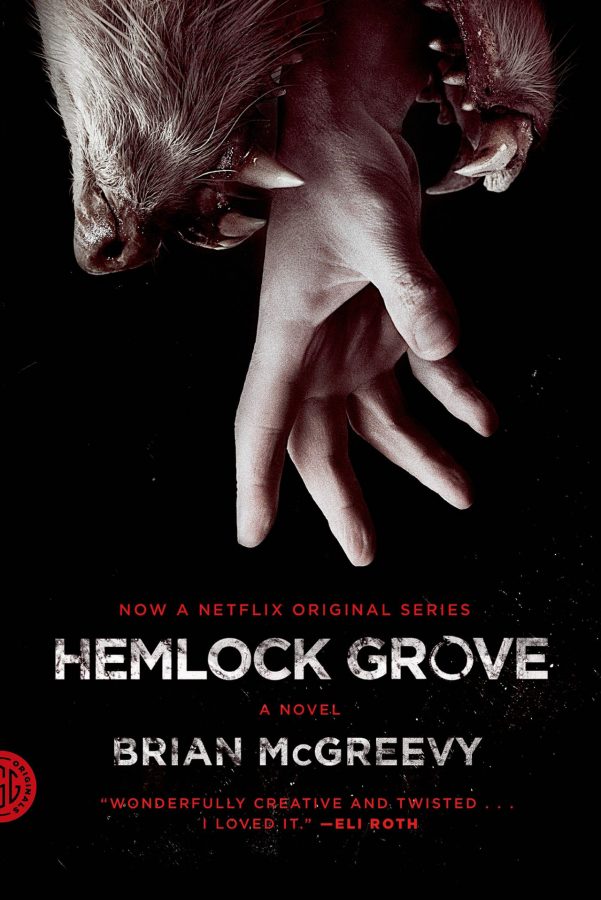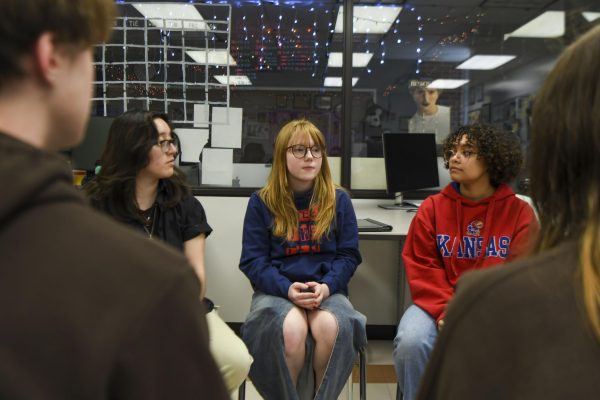Hemlock Grove Review
February 27, 2017
Brutal murder; a morally ambiguous psychiatrist; a young girl who believes she was impregnated by an angel; a Frankenstein-like sixteen year old; a thieving gypsy boy; an unethical scientist; werewolves, vampires, mental-institution patients. All of these things and more can found within the pages of author Brian McGreevy’s breakout novel, Hemlock Grove.
Hemlock Grove is better known by most as the twisted Netflix original starring Bill Skarsgard and Landon Liboiron—after all, the show was viewed by more members globally in its first weekend House of Cards which was once Netflix’s most-watched program. However, before it was a booming Netflix original, Hemlock Grove was a stand-alone novel, gathering dust beside less violent and more romantic werewolf/vampire novels. Its popularity remains lackluster at best, despite the gripping front cover and the world’s newfound obsession with the supernatural. There are many reasons for this, the most prominent perhaps being that McGreevy’s sentence structure is so messy and his grammar so confused that understanding the novel the first time around is nearly impossible. The book ended up being nothing short of a harrowing disappointment in comparison to the show, which I watched and adored before finding out about its written predecessor.
I didn’t finish the novel the first time around. Almost a year after putting it down, I decided to pick it up again. I’d rewatched the television show and needed something to steady the binge-watching withdrawals. I found myself adapting to McGreevy’s intricate writing style and falling head-over-heels for this odd, clever novel. McGreevy’s writing now seems more like a test than a failure; it forces you to be fully invested in the book and, challenges the reader to use your brain as you read it instead of just sitting back and relaxing at the predictable dialogue and hackneyed plot lines that characterize fantasy novels today. You have to be prepared to read this novel; it isn’t like anything you’ve read before, especially in this worn-out genre. I’ve read the book four times since then. It just doesn’t get old.
Don’t be scared away by the mention of werewolves and vampires above. This is not your classic (overworked) werewolf/vampire story. In most popular fantasy plots, with the obvious example being Stephenie Meyer’s Twilight, characterization goes as far as “vampire” or “werewolf”—no further description or character traits needed. In Hemlock Grove, the monstrosities lying beneath characters’ skins serve to further define them. The fact of werewolfism or vampirism or humanity, respectively, work to add a subelement to each character; it is nowhere near the most important thing about any of them.
McGreevy has an amazing grasp on his characters’ voices, whether it be Shelley’s charming E-Mails to her uncle that read as if written by an entirely different author, Peter’s jumbled thoughts during his chapters of narration, Roman’s choppy self-expression or Olivia’s cool, dramatic language—it’s impossible to get characters confused. This is something very special that takes a backseat in the television series, since characters’ voices are a more physical concept in the show. The change between characters’ figurative voices is not as noticeable when Peter literally sounds like a teenage boy and Olivia like a grown woman.
Speaking of the show’s voices: you’ll be hard-pressed to find one that you know, which is shocking considering the incredible acting delivered by both main and minor cast members.
The show’s actors impeccably carry the beautiful plot line, which follows the novel almost exactly throughout the first season. This makes sense seeing as how McGreevy is one of three writers for the show, along with Lee Shipman and Danielle Page. Just about all of the dialogue and scenes remain exactly the same between both platforms. There is one major difference with the end of the novel versus the end of the first season of the show; the novel ends in a way that doesn’t leave much room for growth. This had to be fixed for the three seasons of Hemlock Grove planned for Netflix. From the last episode of the first season to the last episode of the third, the television show’s writers are on their own. The second seasons wraps up the loose ends that McGreevy previously left in his novel, providing answers for readers looking for more. The third seasons is a catastrophic disappointment with a sudden ending that I suppose was meant to shock viewers and break hearts, but instead just made it seem like the producers ran out of money and had to wrap everything up, quick. It’s almost better to drop off at the first season while McGreevy’s artistry can still be seen than hang on to the derailing train of a plot.
The show is guaranteed to make you feel nauseous at more than one point, whether it be the horribly graphic murder thrown in before the first episode’s theme song or the vile man-to-werewolf transformation in episode two. It’s not for the weak of heart or stomach. Spoiler alert: someone eats a maggot that had spent the previous night in a jar of a dead girl’s rotten guts. But, seriously; the show is worth it. You even grow to (sort of) appreciate the grotesque scenes by the time the show is finished. You can at least appreciate that McGreevy isn’t afraid to scare off his more weak-hearted viewers.
Both the show and the book easily make it to my top-five favorites of all time. You just can’t beat the complicated, clever writing style and exquisite acting. I heartily recommend watching the show before reading the book, as it will make it much easier to understand, but either way you will be entertained.
















